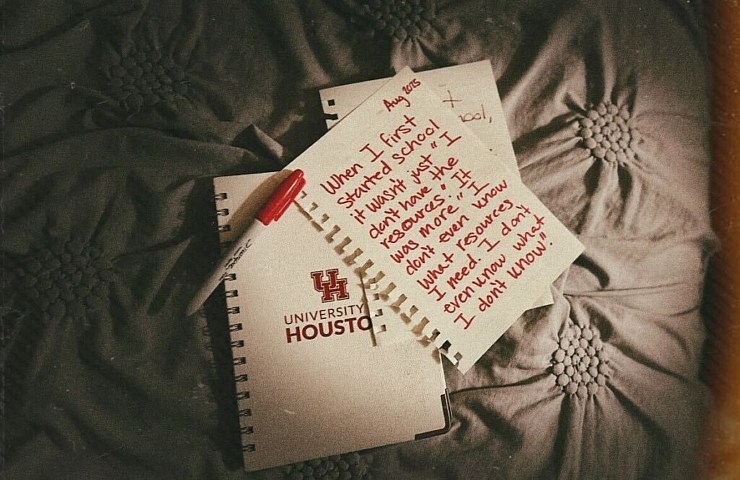Being a first-generation college student often encompasses a lack of support, feelings of being out of place and an overwhelming sense of self-doubt.
Many University of Houston students fall into the first-gen category and find themselves navigating these emotions. These students share similar hopes of overcoming the feelings and reaping the benefits at the end of the journey.
Understanding that these hopes do not always actualize for some and how nuanced the experience can be, Cooglife interviewed some first-gen students to get a better understanding of what it is actually like to be first-generation in college.
One student was a sociology major. The other is in the Cullen School of Engineering.
We asked them several reflexive questions about their experiences, and they shared candidly with us what being first-gen has been like and what it means to them.
First-Generation College Expectations
Nicole Emsley, the sociology major, expressed what her original expectations were.
“I expected to make good friends and get a quality education,” Emsley said. “I expected it to be way better than my struggles in public school as a poor kid.”
She added, “My dream college was a place that would save me from poverty.”
For Ahn Nguyen, the engineering major, college was less about her own dreams and more about her family’s. Still, like Emsley, she hoped to gain lifelong friends and meaningful experiences.
First-Generation Lessons
Many first-generation students enter college with big goals, but along the way, they realize it is also a place to learn broader life lessons. That proved true for both Emsley and Nguyen.
“I used my major and classes as a way to educate myself on why being a first-gen sucked,” Emsley said. “[My peers’] parents paid for their time there, and it was just a part of the plan their whole life, whereas this was a massive deal for me and something I wasn’t sure I would be able to attain.”
For many, this is one of the first truths of the first-gen experience. Wealth disparities quickly become clear.
“It’s crazy how much learning about something can be so expensive,” Nguyen said.
Nevertheless, both students persisted, keeping their goals in mind.
First-Generation Accomplishments
“I feel like a bridge,” Emsley said. “I eventually learned to talk about my upbringing and childhood in a way that taught my closest friends, clubs and even classmates about an entire part of society they didn’t understand.”
For Emsley, being a voice for others in similar positions is among her greatest accomplishments. She encourages other first-generation students to both step out of their comfort zone and to build community within the university.
“Find other first-generation students at your university,” she said. “These are your people! They know what you don’t know yet, and they can help.”
Nguyen agreed, adding that finding community ranks high on her own list of achievements.
“[My friends] put things into perspective for me so that I can help myself and push me out of my comfort zone,” she said.
Often, these more personal realizations don’t seem like major accomplishments to first-generation students, but they are. These are just as important as academic achievements and successes.
Nguyen shared her thoughts on the matter.
“Life and living shouldn’t just be about academics, the fear of losing money or going broke. Everything is a balance; you just have to find yours,” Nguyen said.
First-Generation Emotions
It is not at all an easy road, though. Like many of their first-gen peers, these two did not get to these points overnight. It took determination, surviving imposter syndrome and the will to overcome obstacles even when they felt too exhausted to.
“And all that while I was questioning my identity—on top of taking care of family and academics,” Nguyen said, recalling her time at community college.
For Emsley, food and financial insecurity often threatened her ability to continue.
“The stakes were always higher,” she said. “I had no safety net… I had to navigate things alone that my peers simply passed off to their parents or families.”
She added, “I had to find ways to get home during break or choose between lunch and dinner depending on when I needed fuel for class.”
From internal to external factors, many first-gen students are required to work significantly harder than their peers. Navigating literal blood, sweat and tears in some cases, some first-gen find themselves angry with their peers.
Beyond their peers, many find themselves annoyed with the system.
As a result, passion, fear, confusion and frustration remain in their emotional rotation, but still they remain hopeful.
First-Generation Future Goals
There is always hope, and there is always love. The circumstances first-generation students undergo often make them stronger and more vulnerable. There is power in both of those, and there will always be.
“I have considered [pursuing further education], but was worried about the cost and time, and whether it would benefit me in the long run,” Nguyen said.
“I had no plan. I didn’t understand how anything worked. I was winging each and every day,” Emsley said. “I did end up getting a master’s, but that fell into place later,” she added.
While Emsley and Nguyen’s stories are both representative in their own ways of the journeys many other first-gen students face, they are also testimonies of first-gen resilience.
“Take your time, and stop comparing yourself to other people,” Nguyen said.
These two had enough of a drive to get into college, and ever since, they’ve maintained that drive to keep pushing forward. It’s not easy, but their stories highlight that it is also not impossible.
“Best of luck to any first-gen students,” Emsley said as her final statement.





Recent Comments